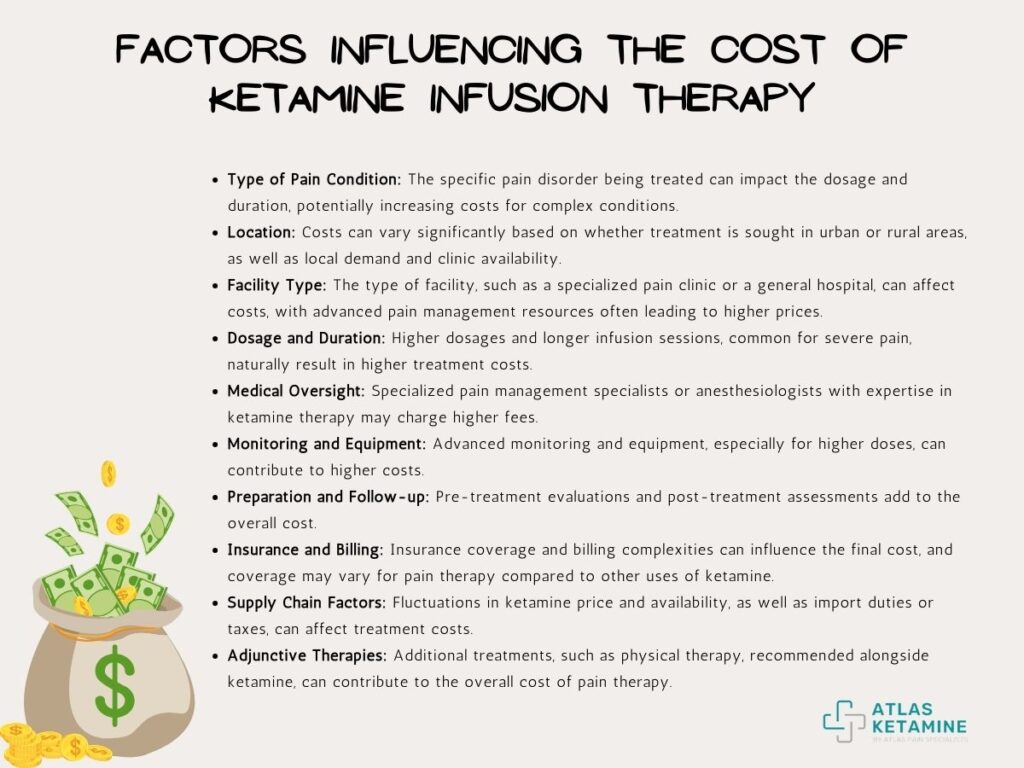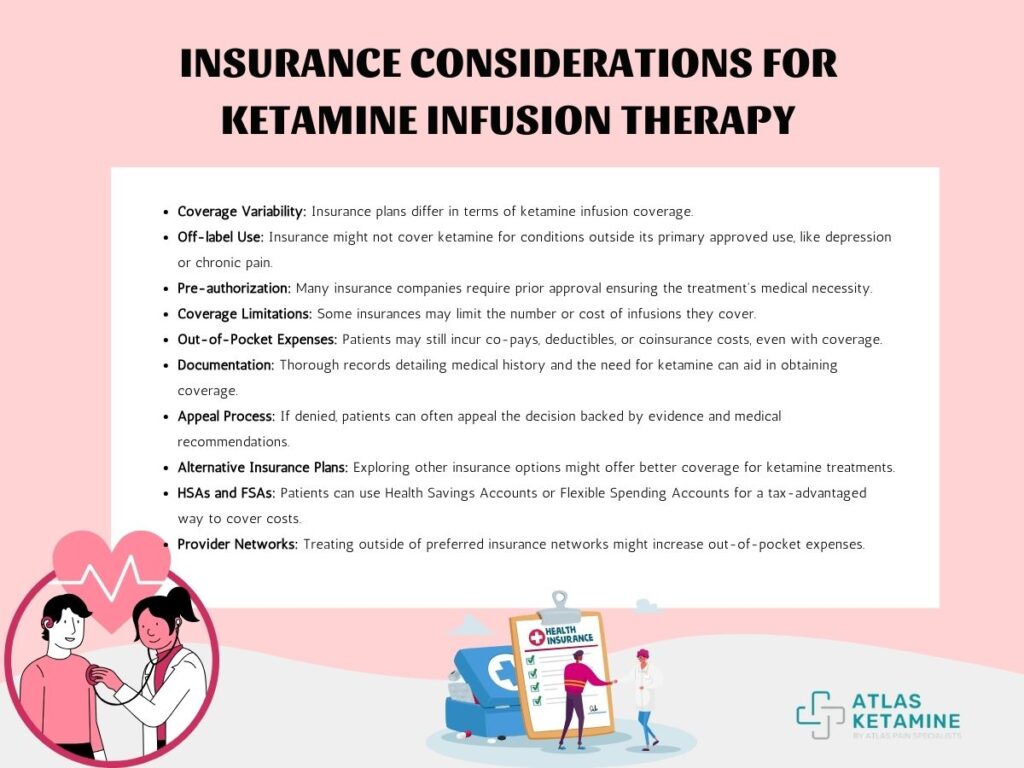Ketamine, initially developed and approved by the FDA as an anesthetic, has gained attention recently as a promising treatment for various conditions, including severe depression, post-traumatic stress disorder (PTSD), and certain pain syndromes.
So how much does a Ketamine infusion cost? In the US, the price of a ketamine infusion ranges from $350 to $1000. It is relatively unusual for providers to charge less than $100 for each injection, although others may charge as much as $1,000.
This article delves deep into the costs associated with ketamine infusions, the factors that influence these costs, and considerations for potential patients.
Basic Costs of Ketamine Infusion
Some medical centers provide preliminary phone tests or consultations at no cost. In the appropriate situations, they may be very useful and economical. However, it's vital to highlight that the first consultation is crucial and best handled by a medical professional or doctor.
The cost of a single ketamine infusion can vary widely based on a number of factors. An average treatment session can range from $350 to $1,000 or more. However, a series of infusions is often recommended to attain sustained therapeutic benefits.
Typically, a course may consist of six infusions over a span of several weeks, making the total initial cost anywhere between $2,100 to $6,000.
Factors Influencing the Cost of Ketamine Infusion Therapy
The landscape of ketamine infusion therapy pricing is complex and multifaceted. Ketamine infusion for pain therapy, especially for chronic or neuropathic pain, involves specific considerations that can influence its cost.
Let's delve deeper into each significant factor:

1. Type of Pain Condition
The specific pain disorder being treated can impact the dosage and duration. Complex conditions may require higher dosages or more extended sessions, which could lead to increased costs.
2. Location
Urban centers or areas with a higher cost of living might charge more than rural regions. Additionally, local demand and the number of available clinics can affect the price.
3. Facility Type
Whether the infusion is provided in a specialized pain clinic, a general hospital, or an anesthesiologist's office can sway the costs. Facilities with advanced pain management resources might charge more.
4. Dosage and Duration
Higher dosages and longer infusion sessions, often required for severe pain conditions, naturally lead to higher costs.
5. Medical Oversight
Pain management specialists or anesthesiologists with expertise in ketamine therapy might command higher fees due to their specialized skill set.
6. Monitoring and Equipment
Advanced monitoring is crucial during ketamine infusion for pain, especially if higher doses are involved. Clinics using state-of-the-art equipment for this purpose might have higher prices.
7. Preparation and Follow-up
Patients might undergo pre-treatment evaluations to gauge the type and extent of pain and post-treatment sessions to assess relief and plan further interventions, adding to the cost.
8. Insurance and Billing
Ketamine treatment for pain might have different insurance coverage than its use for conditions like depression. The billing complexities and insurance negotiations can influence the final bill.
9. Supply Chain Factors
The price and availability of ketamine in the market can fluctuate, affecting the cost. Import duties or taxes might also affect regions importing the drug.
10. Adjunctive Therapies
Some clinics might recommend additional treatments, like physical therapy, alongside ketamine to enhance pain relief, adding to the overall cost.
Understanding these factors provides a clearer picture for patients seeking ketamine infusion as a pain therapy solution, helping them make informed decisions.
Cost-Effectiveness Analysis of Ketamine Infusion Therapy
A Cost-Effectiveness Analysis (CEA) evaluates the costs and effects of a treatment or intervention compared to an alternative, usually standard care, to determine which offers better value for money.
The overall cost of ketamine therapy will be proportional to the number of injections you get. During your appointment, we will discuss these specifics in greater detail. Our team of experienced medical professionals at the Atlas clinic can determine the optimal frequency of infusions.
It's worth noting that many centers provide patients with up to six treatments (two per week). Clinical trials investigating the effects of six infusions have shown that this strategy is beneficial in treating depression.
This is a typical example of a clinic's most basic infusion plan.
- Multiple infusions are often offered in the induction series at almost all clinics. Six infusions over two to three weeks are the norm, with the NIMH research protocol of three infusions per week for two weeks being the most often used schedule.
- Studies have shown that little schedule deviations, or even four infusions vs. six infusions, had no effect on the treatment's efficacy. Most importantly, remember that the first three or four infusions of a series of six infusions should be spaced no more than two or three days apart, rather than a week or more.
- If you have reached your desired effect after the first two or three infusions, you may space them out by up to a week. If you are still making progress, perhaps with some good days and some poor days, it is advisable to adhere to the regular plan to maximize the advantages.
While the initial investment for ketamine treatment can be substantial, it's essential to weigh this against potential benefits:
- Rapid Relief: Many patients report rapid relief from symptoms, sometimes after just one or two infusions.
- Decreased Hospitalizations: For some, ketamine infusions can reduce or eliminate the need for hospitalization, leading to cost savings in the long run.
- Improved Quality of Life: The potential for improved daily functioning and quality of life can be invaluable.
Insurance Considerations for Ketamine Infusion Therapy
Navigating insurance coverage for ketamine infusion can be challenging due to its off-label use in many cases, especially for conditions like depression or chronic pain.
Here are key points to consider:

- Coverage Variability: Insurance plans can differ significantly in terms of whether they cover ketamine infusion therapy.
- Off-label Use: Insurance may not cover ketamine when used for conditions outside its primary approved use, such as depression or chronic pain.
- Pre-authorization: Many insurance companies require prior approval to confirm the medical necessity of ketamine treatment.
- Coverage Limitations: Some insurance plans may have limitations on the number of infusions they cover or the maximum cost they will reimburse.
- Out-of-Pocket Expenses: Patients may still be responsible for co-pays, deductibles, or coinsurance costs, even if their insurance covers ketamine therapy.
- Documentation: Maintaining thorough medical records that detail the patient's medical history and the necessity of ketamine treatment can be helpful in obtaining insurance coverage.
- Appeal Process: Patients have the option to appeal insurance denials by providing evidence and medical recommendations to support the need for ketamine therapy.
- Alternative Insurance Plans: Exploring different insurance options may lead to better coverage for ketamine treatments.
- HSAs and FSAs: Patients can use Health Savings Accounts (HSAs) or Flexible Spending Accounts (FSAs) for a tax-advantaged way to cover ketamine therapy costs.
- Provider Networks: Receiving treatment from providers outside of a preferred insurance network may result in increased out-of-pocket expenses.
In short, navigating insurance for ketamine infusions can be complex, and patients need to understand their policy details, consult their providers, and be proactive in seeking coverage or alternatives.
Potential Additional Costs
When considering ketamine infusion therapy, it's essential to look beyond the base price of the treatment itself. Several other costs can influence the overall expense. Here are some potential additional expenses:
- Initial Consultation: Fees for the preliminary assessment to determine treatment suitability.
- Monitoring Equipment: Some clinics might charge separately for advanced monitoring during the infusion.
- Adjunctive Medications: Additional costs for medications prescribed alongside ketamine.
- Follow-up Sessions: Charges for maintenance or booster sessions post-primary treatment.
- Travel and Accommodation: Expenses for reaching the clinic and potential overnight stays.
- Therapeutic Support: Separate costs for complementary therapies like counseling.
- Lab Tests: Periodic tests to monitor health during treatment.
- Insurance Deductibles: Out-of-pocket expenses before insurance coverage begins.
Understanding these potential added costs allows patients to budget appropriately and ensures there are no unexpected financial surprises during their treatment journey.
Conclusion
Understanding the full spectrum of costs associated with ketamine infusion therapy is essential for patients considering this treatment. Beyond the primary infusion price, additional expenses like consultations, medications, and potential follow-up sessions exist.
Insurance coverage for ketamine, especially for off-label uses, can be inconsistent, making patient advocacy vital. When evaluating the choice between single and multiple infusions, immediate costs and long-term benefits should be weighed.
Ultimately, while financial aspects are significant, therapeutic outcomes and individual needs should drive the decision to pursue ketamine therapy.
